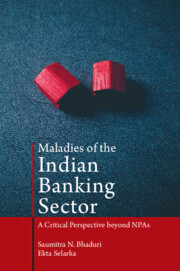Book contents
- Frontmatter
- Dedication
- Contents
- List of Figures
- List of Tables
- Foreword
- Acknowledgements
- 1 Prologue
- 2 The Indian Banking Sector: A Brief History
- 3 The Index of Credit Allocative Efficiency
- 4 Macroeconomic Analyses of Bank Credit Misallocation in the Indian Corporate Sector: Investigation of Pro-cyclicality
- 5 Determinants of Bank Credit Misallocation: Firm-level Analysis
- 6 Allocative Efficiency of Bank Credit and Firm Performance
- 7 Credit Reallocation by Indian Banks in the Aftermath of the Global Financial Crisis
- 8 The Zombie Story: Credit Boom and the Rise of Zombie Firms in the Indian Economy
- 9 Epilogue
- Bibliography
- Index
5 - Determinants of Bank Credit Misallocation: Firm-level Analysis
Published online by Cambridge University Press: 27 September 2022
- Frontmatter
- Dedication
- Contents
- List of Figures
- List of Tables
- Foreword
- Acknowledgements
- 1 Prologue
- 2 The Indian Banking Sector: A Brief History
- 3 The Index of Credit Allocative Efficiency
- 4 Macroeconomic Analyses of Bank Credit Misallocation in the Indian Corporate Sector: Investigation of Pro-cyclicality
- 5 Determinants of Bank Credit Misallocation: Firm-level Analysis
- 6 Allocative Efficiency of Bank Credit and Firm Performance
- 7 Credit Reallocation by Indian Banks in the Aftermath of the Global Financial Crisis
- 8 The Zombie Story: Credit Boom and the Rise of Zombie Firms in the Indian Economy
- 9 Epilogue
- Bibliography
- Index
Summary
One of the key contentions of economic studies, as discussed earlier, is the efficient allocation of resources among the various market participants in the economy. Among them, efficient allocation of capital remains the most discussed and debated topic among policy-makers and academicians across the world. The availability of external funding, especially bank credit and ease of access to bank credit, contributes to the financial deepening of an economy, facilitating the aggregate output and overall economic activity (King and Levine, 1993). Therefore, efficient credit allocation becomes critical where companies continue to rely on bank lending for financing (Booth et al., 2001; Giannetti, 2003). This is further aggravated in the economies where we observe weakly developed capital markets and weak shareholder and creditor protection.
Interestingly, when the narrative shifts to emerging markets like India, where banks are the largest suppliers of credit, several questions are posed on efficient allocation of bank credit among many firms operating in different settings of industry, the scale of operation, and performance. Although the growing body of literature has examined the misallocation of bank credit, particularly with respect to the emerging markets, the overall conclusion remains ambiguous so far. For example, in a cross-country study, Taboada (2011) reports that higher bank credit is allocated to less productive industries and those firms with less dependence on external finance. In contrast, Chen, Skully, and Kym (2005) and Firth et al. (2009) find the evidence of allocation of bank credit to better governed and more profitable firms in various country-specific studies. Among the several reasons for misallocation discussed in the literature, ownership structure of banks, agency problems, weak legal system, political influence, poor corporate governance both at the firm and at the bank level, fraud and corruption, and biased lending by banks have been referred to as prominent factors of emerging economies (La Porta, Lopez-de-Silanes, and Shleifer, 2002; Sapienza, 2004; Ding and Ge, 2005; Illueca, Norden, and Udell, 2014). At the same time, each emerging market has its own unique institutional and operating environment, which, on the one hand, restricts us from applying a universal model across all such economies and, on the other hand, calls for country-specific studies.
- Type
- Chapter
- Information
- Maladies of the Indian Banking SectorA Critical Perspective beyond NPAs, pp. 95 - 123Publisher: Cambridge University PressPrint publication year: 2022



